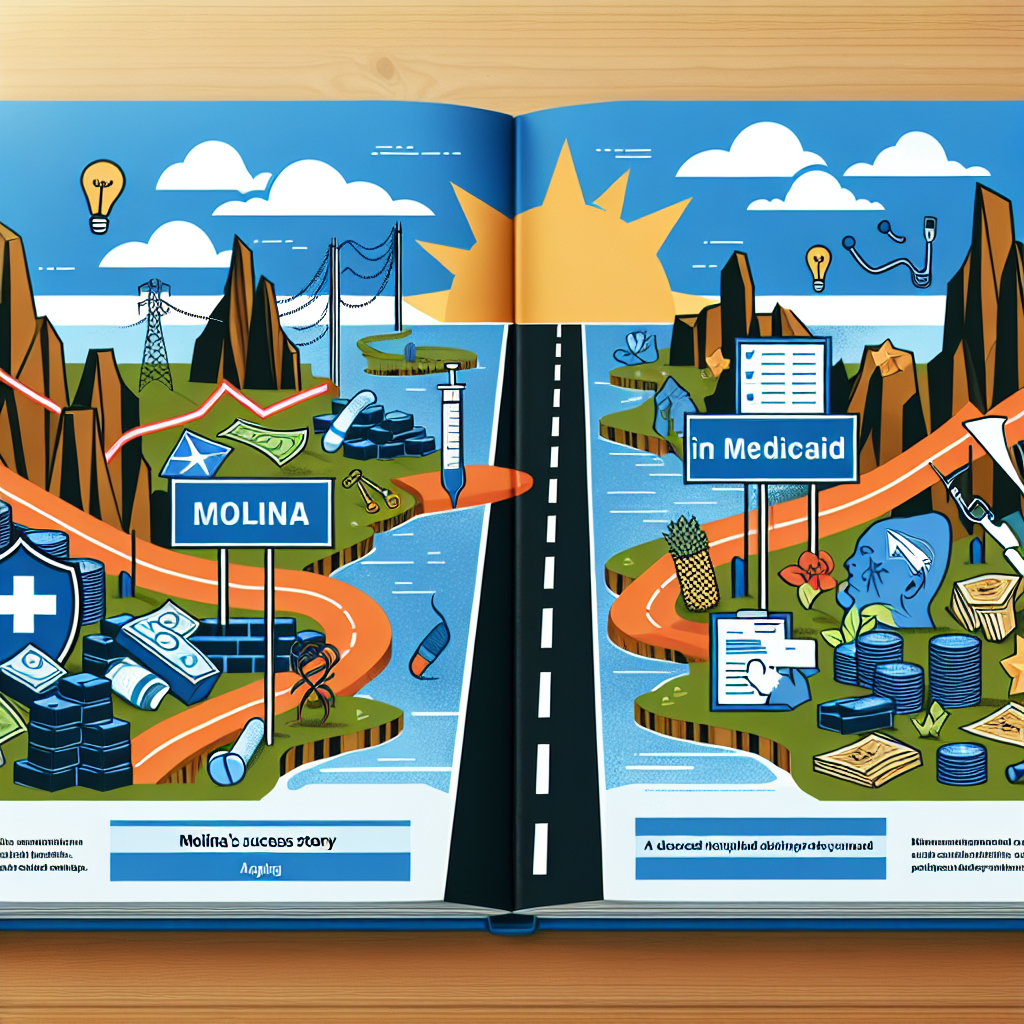Molina’s Success Story: Overcoming Challenges in Medicaid

Molina Healthcare, a Fortune 500 company, has become a significant player in the Medicaid managed care sector. Founded in 1980 by Dr. C. David Molina, the company has grown from a single clinic in Long Beach, California, to a nationwide provider of healthcare services. This article explores Molina’s journey, focusing on how the company has successfully navigated the complex landscape of Medicaid, overcoming numerous challenges along the way. We will delve into five key subtopics that highlight Molina’s strategies, innovations, and impact on the healthcare industry.
1. The Genesis of Molina Healthcare
The story of Molina Healthcare begins with its founder, Dr. C. David Molina, an emergency room physician who recognized the need for accessible healthcare for low-income families. In the early 1980s, Dr. Molina opened a clinic in Long Beach, California, with the mission of providing quality care to underserved populations. This section explores the early days of Molina Healthcare and the foundational principles that guided its growth.
1.1 Dr. C. David Molina’s Vision
Dr. Molina’s vision was rooted in his experiences as an emergency room physician, where he witnessed firsthand the challenges faced by low-income patients. He believed that everyone deserved access to quality healthcare, regardless of their financial situation. This belief became the cornerstone of Molina Healthcare’s mission.
Dr. Molina’s approach was innovative for its time. He focused on preventive care and patient education, aiming to reduce the need for emergency room visits. By establishing a network of clinics, he sought to provide comprehensive care that addressed both immediate and long-term health needs.
1.2 The First Clinic and Its Impact
The first Molina clinic opened in 1980 in Long Beach, California. It quickly became a model for delivering healthcare to underserved communities. The clinic offered a range of services, including primary care, pediatrics, and women’s health, all under one roof. This holistic approach was designed to meet the diverse needs of the community.
The success of the Long Beach clinic demonstrated the viability of Dr. Molina’s model. It also highlighted the demand for accessible healthcare services among low-income populations. This success laid the groundwork for the expansion of Molina Healthcare into other regions.
1.3 Expansion and Growth
Building on the success of the Long Beach clinic, Molina Healthcare began to expand its operations. The company opened additional clinics in California and other states, each designed to serve the unique needs of its community. This expansion was driven by a commitment to maintaining the quality and accessibility of care.
As Molina Healthcare grew, it also began to diversify its services. The company expanded into Medicaid managed care, leveraging its expertise in serving low-income populations. This move allowed Molina to reach even more patients and solidify its position as a leader in the healthcare industry.
1.4 Challenges in the Early Years
The early years of Molina Healthcare were not without challenges. The company faced financial constraints, regulatory hurdles, and competition from established healthcare providers. However, Dr. Molina’s commitment to his mission and his innovative approach to healthcare delivery helped the company overcome these obstacles.
One of the key challenges was securing funding for expansion. Molina Healthcare relied on a combination of private investment and government contracts to finance its growth. This required careful financial management and strategic planning.
1.5 Legacy of Dr. C. David Molina
Dr. C. David Molina passed away in 1996, but his legacy lives on through the company he founded. Molina Healthcare continues to uphold his vision of providing quality care to underserved populations. The company’s success is a testament to Dr. Molina’s pioneering spirit and dedication to improving healthcare access for all.
Today, Molina Healthcare is a leading provider of Medicaid managed care services, serving millions of members across the United States. The company’s continued growth and success are a reflection of its commitment to its founding principles.
2. Navigating the Complexities of Medicaid
Medicaid is a complex and ever-evolving program that provides healthcare coverage to millions of low-income Americans. Navigating this landscape requires a deep understanding of regulatory requirements, financial management, and patient needs. This section explores how Molina Healthcare has successfully managed these complexities to become a leader in Medicaid managed care.
2.1 Understanding Medicaid’s Structure
Medicaid is a joint federal and state program that provides healthcare coverage to eligible low-income individuals and families. Each state administers its own Medicaid program within federal guidelines, resulting in significant variation in coverage and services across the country.
Molina Healthcare has developed expertise in navigating this complex structure. The company works closely with state governments to understand their specific requirements and tailor its services accordingly. This flexibility has been key to Molina’s success in the Medicaid market.
2.2 Regulatory Compliance and Challenges
Compliance with Medicaid regulations is a critical aspect of Molina Healthcare’s operations. The company must adhere to a wide range of federal and state requirements, including eligibility criteria, benefits, and reimbursement rates. This requires a robust compliance framework and ongoing monitoring to ensure adherence to all regulations.
Molina Healthcare has invested heavily in compliance infrastructure, including dedicated teams and technology solutions. This investment has enabled the company to navigate regulatory challenges effectively and maintain its reputation as a trusted Medicaid provider.
2.3 Financial Management and Sustainability
Financial management is another key challenge in the Medicaid market. Reimbursement rates for Medicaid services are typically lower than those for commercial insurance, requiring careful cost management to ensure financial sustainability.
Molina Healthcare has implemented a range of strategies to manage costs while maintaining quality care. These include negotiating favorable contracts with providers, implementing cost-effective care models, and leveraging technology to improve efficiency.
2.4 Addressing Patient Needs
Understanding and addressing the needs of Medicaid patients is central to Molina Healthcare’s mission. Medicaid populations often face unique challenges, including social determinants of health, language barriers, and limited access to care.
Molina Healthcare has developed a range of programs and services to address these needs. These include care coordination, health education, and community outreach initiatives. By focusing on the whole person, Molina aims to improve health outcomes and enhance the patient experience.
2.5 Innovations in Medicaid Managed Care
Innovation is a key driver of Molina Healthcare’s success in the Medicaid market. The company has embraced new technologies and care models to improve service delivery and patient outcomes.
One example is Molina’s use of telehealth services to expand access to care for Medicaid members. Telehealth allows patients to receive care remotely, reducing barriers to access and improving convenience. Molina has also implemented data analytics to identify high-risk patients and tailor interventions accordingly.
3. Strategic Partnerships and Collaborations
Strategic partnerships and collaborations have played a crucial role in Molina Healthcare’s success. By working with a diverse range of stakeholders, including government agencies, healthcare providers, and community organizations, Molina has been able to enhance its services and expand its reach. This section explores the importance of these partnerships and how they have contributed to Molina’s growth.
3.1 Collaborations with Government Agencies
Molina Healthcare’s relationship with government agencies is fundamental to its operations. The company works closely with state Medicaid agencies to develop and implement programs that meet the needs of low-income populations. These collaborations are essential for ensuring compliance with regulatory requirements and securing funding for services.
Through these partnerships, Molina has been able to influence policy decisions and advocate for improvements in Medicaid services. This has allowed the company to play a proactive role in shaping the future of Medicaid managed care.
3.2 Partnerships with Healthcare Providers
Strong partnerships with healthcare providers are critical for delivering quality care to Medicaid members. Molina Healthcare collaborates with a network of providers, including hospitals, clinics, and specialists, to ensure comprehensive and coordinated care.
These partnerships are built on mutual trust and shared goals. Molina works closely with providers to negotiate contracts, develop care protocols, and implement quality improvement initiatives. This collaborative approach has been key to maintaining high standards of care and achieving positive health outcomes.
3.3 Community Engagement and Outreach
Community engagement is a core component of Molina Healthcare’s strategy. The company partners with community organizations to address social determinants of health and improve access to care for underserved populations.
Molina’s community outreach initiatives include health fairs, educational workshops, and support programs for vulnerable populations. By engaging with the community, Molina is able to build trust and strengthen its relationships with patients and stakeholders.
3.4 Collaborations with Technology Partners
Technology plays a vital role in Molina Healthcare’s operations. The company partners with technology providers to implement innovative solutions that enhance service delivery and improve patient outcomes.
These collaborations have enabled Molina to leverage data analytics, telehealth, and electronic health records to improve care coordination and efficiency. By embracing technology, Molina is able to stay at the forefront of healthcare innovation and deliver value to its members.
3.5 Impact of Strategic Partnerships
The impact of Molina Healthcare’s strategic partnerships is evident in its continued growth and success. These collaborations have enabled the company to expand its services, improve care quality, and enhance patient satisfaction.
By working with a diverse range of stakeholders, Molina has been able to address the complex challenges of Medicaid managed care and deliver on its mission of providing quality care to underserved populations. These partnerships are a testament to Molina’s commitment to collaboration and innovation.
4. Innovations in Care Delivery
Innovation is at the heart of Molina Healthcare’s approach to care delivery. The company has embraced new technologies and care models to improve service delivery and patient outcomes. This section explores some of the key innovations that have contributed to Molina’s success in the Medicaid market.
4.1 Telehealth Services
Telehealth has become an essential component of Molina Healthcare’s service delivery model. By offering remote consultations and virtual care, Molina has been able to expand access to care for Medicaid members, particularly in rural and underserved areas.
Telehealth services have been instrumental in reducing barriers to access, such as transportation and scheduling challenges. They have also improved convenience for patients, allowing them to receive care from the comfort of their homes.
4.2 Data Analytics and Population Health Management
Molina Healthcare has invested in data analytics to enhance its population health management capabilities. By analyzing patient data, the company can identify high-risk individuals and tailor interventions to address their specific needs.
This data-driven approach has enabled Molina to improve care coordination, reduce hospital readmissions, and enhance patient outcomes. It has also allowed the company to allocate resources more effectively and improve operational efficiency.
4.3 Integrated Care Models
Integrated care models are a key innovation in Molina Healthcare’s approach to service delivery. These models focus on coordinating care across different providers and settings to ensure comprehensive and seamless care for patients.
Molina’s integrated care models include care coordination teams, patient-centered medical homes, and collaborative care networks. These initiatives have been successful in improving care quality, reducing costs, and enhancing patient satisfaction.
4.4 Patient Engagement and Education
Patient engagement and education are central to Molina Healthcare’s mission of improving health outcomes. The company has developed a range of programs and resources to empower patients to take an active role in their health.
These initiatives include health education workshops, online resources, and personalized care plans. By engaging patients in their care, Molina aims to improve adherence to treatment plans and promote healthier lifestyles.
4.5 Innovations in Behavioral Health
Behavioral health is a critical component of Molina Healthcare’s service offerings. The company has implemented innovative programs to address the mental health needs of Medicaid members.
These programs include integrated behavioral health services, telepsychiatry, and support groups for individuals with mental health conditions. By addressing behavioral health needs, Molina aims to improve overall health outcomes and enhance the quality of life for its members.
5. Impact on the Healthcare Industry
Molina Healthcare’s success story is not only a testament to its ability to overcome challenges in Medicaid but also its impact on the broader healthcare industry. This section explores how Molina’s innovations, strategies, and partnerships have influenced the industry and contributed to positive change.
5.1 Setting Standards for Medicaid Managed Care
Molina Healthcare has set high standards for Medicaid managed care, demonstrating that it is possible to deliver quality care while maintaining financial sustainability. The company’s success has inspired other providers to adopt similar models and approaches.
By prioritizing patient-centered care, innovation, and collaboration, Molina has shown that Medicaid managed care can be both effective and efficient. This has contributed to a shift in the industry towards more value-based care models.
5.2 Influence on Policy and Regulation
Molina Healthcare has played an active role in shaping policy and regulation in the Medicaid market. The company has advocated for improvements in Medicaid services and worked with government agencies to develop programs that meet the needs of low-income populations.
This advocacy has contributed to positive changes in Medicaid policy, including increased funding for services, expanded coverage options, and improved access to care for underserved populations.
5.3 Advancements in Healthcare Technology
Molina Healthcare’s embrace of technology has had a significant impact on the healthcare industry. The company’s use of telehealth, data analytics, and electronic health records has set a precedent for other providers to follow.
These technological advancements have improved care delivery, enhanced patient outcomes, and increased operational efficiency. They have also contributed to a broader trend towards digital transformation in healthcare.
5.4 Contributions to Health Equity
Molina Healthcare’s commitment to serving underserved populations has contributed to greater health equity in the United States. By providing quality care to low-income individuals and families, Molina has helped to reduce disparities in access to healthcare.
The company’s focus on social determinants of health and community engagement has also played a role in addressing the root causes of health inequities. This has contributed to improved health outcomes and quality of life for vulnerable populations.
5.5 Recognition and Awards
Molina Healthcare’s achievements have been recognized by numerous awards and accolades. The company has been named a Fortune 500 company and has received recognition for its commitment to quality care, innovation, and community engagement.
These awards are a testament to Molina’s impact on the healthcare industry and its dedication to improving the lives of its members. They also serve as an inspiration for other providers to strive for excellence in Medicaid managed care.
Conclusion
Molina Healthcare’s success story is a powerful example of how a company can overcome challenges in Medicaid and make a meaningful impact on the healthcare industry. Through its commitment to quality care, innovation, and collaboration, Molina has set new standards for Medicaid managed care and contributed to positive change in the industry.
The company’s journey from a single clinic in Long Beach to a nationwide provider of healthcare services is a testament to the vision and dedication of its founder, Dr. C. David Molina. Today, Molina Healthcare continues to uphold his legacy by providing quality care to underserved populations and advocating for improvements in Medicaid services.
As the healthcare industry continues to evolve, Molina Healthcare’s success story serves as an inspiration for other providers to embrace innovation, collaboration, and patient-centered care. By doing so, they can overcome challenges and make a lasting impact on the lives of their patients.





